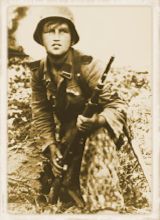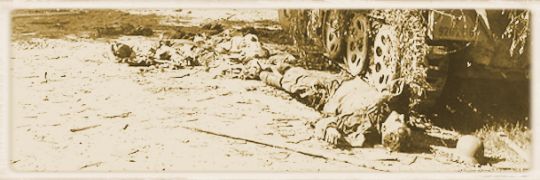Broken lives

When we talk about war, we are used to think just in terms of the “good” and the “wicked”, especially if the conflict in question is the Second World War, where the Axis and the Allies engaged in the bloodiest contest in human history. But war is also a complex event, where the stories of individuals are interwoven with other thousands of lives, and where individual choices are often the result of pressures and situations that are beyond the control of a single human being. So the roles intersect and the persecutor becomes the victim, the victim becomes the persecutor, and any categories, classifications, and clusters lose their meaning. Overall, a judgment can still be expressed, but when we come down to the individual level, the thin red line between right and wrong, good and bad, gets fainter, until it disappears entirely, leaving only a great sense of bitterness and sadness for so many wasted lives and so much suffering that perhaps could have been avoided.
Last night my mother told me a story. The period is towards the end of World War II in Europe, during the retreat of the Germans from Italy. At that time she lived in the Marche. One day a long line of exhausted Nazi soldiers arrived in the village where she lived. Most of them were boys between the ages of sixteen and eighteen years; here and there, there were some veterans of the First World War, old men who could barely take up a gun. They did not try to occupy the small town or harass the people; they did nothing but stopping for a few hours in the shade of the oak trees growing near the town square, waiting to resume the long march to the north. In the village there were almost only women, old people, and children. The men were partly in the fascist army, partly with the partisans, partly… well, no one knew where they were or if they were still alive. Despite this, those families were living together, or should I say, they were surviving by helping each other.
When the soldiers arrived to the village, many women brought them food and drink. No much, because the war had taken them practically everything, but in the countryside it was better than in the cities because there were water wells, land to grow vegetables, and some animals for milk to produce cheese. Today it may seem strange to us, but that their sons or husbands were fascist or partisan made no difference: the whole village gave some relief to those guys, the eyes lost in nowhere, disenchanted, without a point of reference, with nothing anymore to believe. They thanked the women with bowed heads, almost shameful to receive that food from those who would once have claimed, then they left the village.

They had just started to march on the dirt road that led from the village to the north, when a group of American fighters sighted them. The Nazis noticed the planes but they were completely uncovered and perhaps they did not even want to fight; in fact they continued to walk, dragging their feet, without even lift their heads toward the sky. The fighters did a couple of laps, then they glided and began to strafe the column. At this point, the Nazis tried to escape, but it was too late. They were literally blown to pieces. Some bombs were dropped too. The whole thing lasted a few minutes, then there was only silence. The fighters did a couple of laps to verify that there were no survivors, then they left.
It was at that point that my mother, who was only 14 years old, along with all the other women of the village, went down on the way to pick up those poor remains. They gathered them with aprons and sheets, because few were left whole. Arms, legs, pieces of viscera… they picked up every little piece, while the old men and the boys were digging a large grave. Then they buried them near the small cemetery of the village. At last, they returned to the village to wash the clothes from all that blood.
It was not just an act of mercy. Many women had seen in those teenagers the children whom no longer they had, many killed in the war buy Allies, others killed by those Nazis who were now leaving the country. Yet they had no doubt: they did it, simply, without asking themselves questions, without giving themselves answers. It was a pure and simple act of pity for boys, torn off other families, speaking a different language but having the same dreams, broken by a propaganda machine that turned them into cannon fodder that should not ask, just obey. Broken lives, broken like their hopes, lives that history remembers having fought on the wrong side, but that a small town in the Italian campaign had collected to give them a piece of land as a final resting place in a foreign land, and to remind us all that it is easy to judge, very easy, especially for those who have not first-hand experience of the war. Have mercy, that’s difficult.




















Please use Facebook only for brief comments.
For longer comments you should use the text area at the bottom of the page.
Facebook Comments